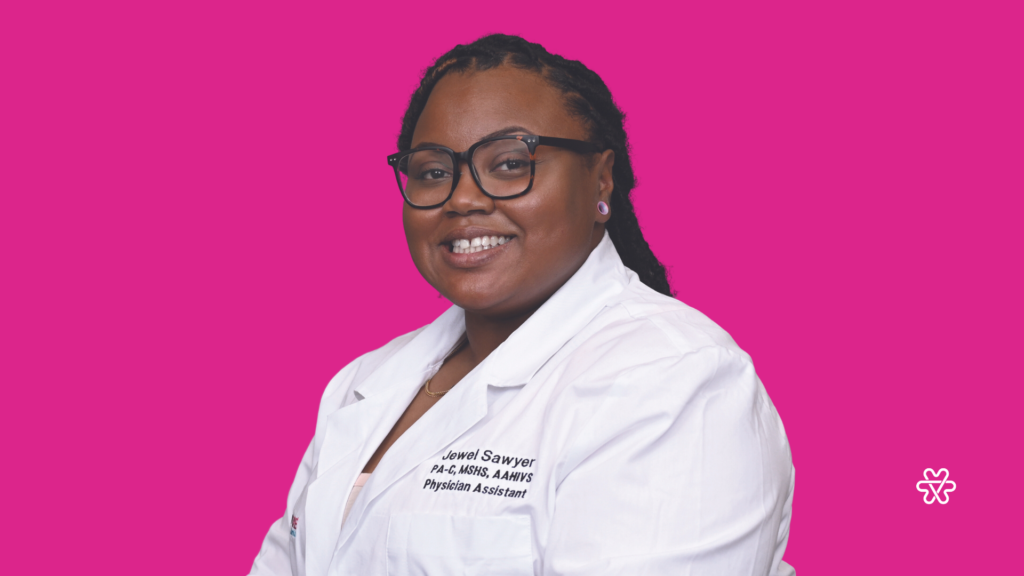Physician Assistant Jewel Sawyer’s passion for LGBTQ+ and HIV care brought her to AvitaCare Atlanta, where “compassion and collaboration go hand in hand.”
From the start of her career as a physician assistant at a reproductive health care clinic to her current role at AvitaCare Atlanta (Avita Care Solutions’ community-focused medical center and pharmacy), Jewel Sawyer has been on the front lines of compassionate care for over a decade. Her commitment to patients, advocacy for HIV prevention, and administration of gender-affirming care reflect her overarching aspiration, “My goal in health care,” she says, “is equity across the board.”
After a brief stint in primary care, Jewel recognized her calling to work for an organization directly impacting health equity and LGBTQ+ affirming care. AvitaCare Atlanta was her answer, and since then, she’s wholeheartedly supported its mission of providing holistic patient care.
Jewel takes pride that her care plays a pivotal role in enhancing positive health outcomes for the Atlanta community. “Atlanta still has one of the highest new HIV infection rates in the nation,” she explains. “AvitaCare Atlanta’s distinct advantage is the experience our providers have in HIV care.”
As an HIV Center of Excellence, AvitaCare Atlanta provides the best care practices that help patients live healthy, fulfilling lives. For instance, over 98% of AvitaCare Atlanta’s patients living with HIV achieve undetectable levels, a remarkable figure compared to the national rate of 56.8%.
“We’re keeping people in care, on medication, adherent to therapy, and improving their overall health outcomes by simply being there for them,” Jewel says.
“Our goal is to make care as easy as possible.”
Jewel is passionate about helping women, LGBTQ+ individuals, and people of color access compassionate and comprehensive care. Unfortunately, barriers such as stigma, insurance gaps, and a lack of culturally competent providers often prevent or hinder minority populations from pursuing care.
“Minorities in healthcare are often forgotten and don’t have a voice in health care. LGBTQ+ people and women specifically deserve to be taken care of,” says Jewel. “My goal is to make them feel comfortable, welcome, and know they not only have a voice in their care but that they should drive conversations about their care.”
With two in five Georgians self-reporting as low-income, being able to find quality, affordable care is essential.
Jewel and the rest of the team at AvitaCare Atlanta navigate around obstacles in the patient journey in multiple ways, which include reducing financial barriers through community programs.
Another vital strategy is cultivating a safe space for patients.
Cultivating a culture of compassionate care
Transgender people and other sexual minority groups often experience “minority stress,” a health risk phenomenon stemming from an unwelcoming, hostile culture that leads to harassment, maltreatment, discrimination, victimization, and—ultimately—negatively impacts access to care. A startling 4 in 5 transgender adults report being treated by physicians with less courtesy or respect than their cisgender and heterosexual counterparts, according to American Progress.
Jewel and her colleagues at AvitaCare Atlanta work tirelessly to ensure minority stress is not a factor at their clinic. “For many of our patients, this is the first place they can meet their authentic selves,” she says. “It’s the first place they can try out their chosen names or try on their pronouns. Even if it’s only 30 minutes to an hour, it can be a relief to them to be in a welcoming and affirming place. For a short time, they can forget what’s outside.”
That unconditional acceptance means the world to her patients, Jewel explains. “They know I won’t ask them questions irrelevant to their level of care,” she says. “They understand I just care about their health and well-being.”
Prevention is for everyone
Another roadblock hindering the fight to end HIV and other sexual wellness concerns is that preventative services like PrEP (pre-exposure prophylaxis) are still predominantly marketed toward cisgender men. Simultaneously, minority patients receive less targeted outreach.
Jewel remains resolute in ensuring transgender individuals and women are not left behind. “If we can have a conversation with women about preventing pregnancy, why can’t we talk more freely with our female-identifying patients about how they contract gonorrhea, chlamydia, or HIV?” she asks. “It can be dangerous out in the world for trans patients and women of color. They often don’t feel seen and heard or that they can be who they truly are.
“To walk around and not have a place to breathe is hard,” she adds. “That’s what AvitaCare Atlanta is: A place where patients can be themselves and feel safe. That’s why I do what I do.”
Serving the whole patient at AvitaCare Atlanta
Unlike other health care clinics, AvitaCare Atlanta’s focuses on the entire individual, not just one aspect of their health. The care team prides itself on offering compassionate, comprehensive, and inclusive care grounded in a holistic approach.
The bottom line? “We provide our patients with the tools they need to care for themselves,” Jewel says. “With that comes mental and nutritional health, which is why behavioral health specialists and a dietitian are on staff. Our onsite pharmacy gives patients immediate access to expert pharmacists who evaluate medications and ensure they work well together. Offering these services in-house is a huge part of making patients feel safe and receiving the highest level of care.”




